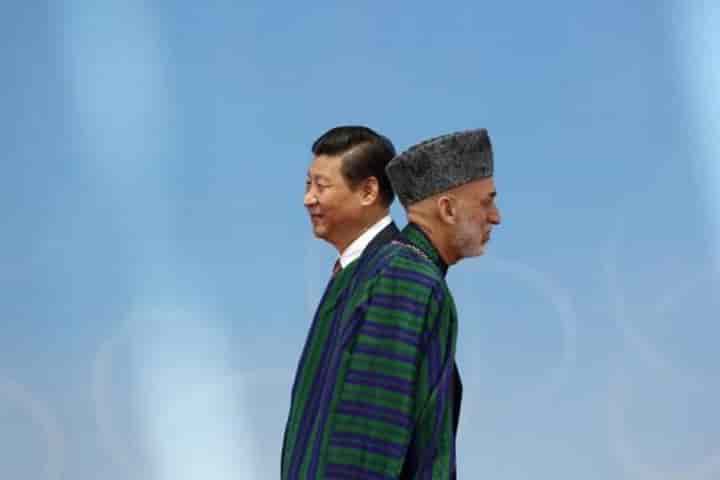

Afghanistan President Hamid Karzai walks past Chinese President Xi Jinping (Pic: Courtesy Twitter/@Reuters)
<p>
<strong>China&rsquo;s decision to pull out 210 nationals from Afghanistan is part of a bigger plan for greater future role in the embattled nation.</strong></p>
<p>
Chinese state media reported that on Friday, China had sent a special Xiamen Air flight to Kabul, ahead of the rapid withdrawal of US and NATO forces from the country, after a two decade long turbulent stay.</p>
<p>
While the withdrawal of nationals appears to be part of a security protocol, it does not signal that China is inclined to lower its engagement with Afghanistan&mdash;a country that has a prized strategic location as it is on the cross-roads of China, South Asia, Central Asia and West Asia. On the contrary, on account of its pivotal status, major regional and global powers, including, China, Russia, Iran, Pakistan, India and the United States are feverishly vying for influence in the country, which is undergoing a chaotic transition.<strong></strong></p>
<p>
<strong><a href="https://www.indianarrative.com/opinion-news/is-china-plotting-with-pakistan-and-taliban-to-pivot-afghanistan-away-from-india-and-the-west-100700.html">Also Read: China would be real winner if Taliban takes over reins in Afghanistan</a></strong></p>
<p>
Afghanistan is also resource rich, with huge reserves of lithium and rare earths&mdash;the super minerals which are at the heart of the digitally powered new economy&mdash;going into everything ranging from laptops, cell phone batteries, electric cars to missiles. Apart from geopolitics, there is therefore a strong geoeconomics angle to the growing competition among existing and rising powers for a foothold in Afghanistan.</p>
<p>
For long, the Chinese have wanted to play a leading role in Afghanistan, buoyed by support from neighbouring Pakistan, and with the Taliban as the frontline.</p>
<p>
<a href="https://www.thehindu.com/news/international/China-now-a-major-player-in-the-AfPak-Central-Asia-theater-Chinese-scholar-Hu-Shisheng/article14593147.ece">&ldquo;The killing of Osama bin Laden was a benchmark, as it marked the Obama</a> administration&rsquo;s policy to scale down American presence in Afghanistan. Ever since, China has given more and more importance to its bilateral ties with Afghanistan. China has to plug the resulting vacuum because no one else would. This is necessary to secure One Belt One Road (OBOR). Then there are compulsions of safeguarding the China Pakistan Economic Corridor (CPEC). Xinjiang&rsquo;s stability is another big concern,&rdquo; said Hu Shisheng, a South Asia expert with the China Institute of Contemporary International Relations (CICIR) had told The Hindu, way back in 2016.</p>
<p>
The Chinese gameplan in Afghanistan rides four pivots.</p>
<p>
First, China wants to pivot Afghanistan in its direction and dock Kabul with Beijing&rsquo;s Belt and Road projects. That structural change is possible by extending the China Pakistan Economic Corridor (CPEC) into Afghanistan. Right now, CPEC starts from the Arabian sea port of Gwadar in Pakistan and the heads to Kashgar in China&rsquo;s Xinjiang province. But it can be further extended into Afghanistan, the gateway to Uzbekistan and the heart of Central Asia.</p>
<p>
<a href="https://www.ft.com/content/49d266c6-a6c2-4ab2-bf52-ed34d72b22c1">&ldquo;We can vouch that China will fund the rebuilding of Afghanistan</a> through the Taliban via Pakistan,&rdquo; the Financial Times quoted an Indian official as saying.&nbsp; &ldquo;China is Pakistan&rsquo;s wallet.&rdquo; FT quoted another diplomat in the region as saying: &ldquo;China at the request of Pakistan will support the Taliban.&rdquo;</p>
<p>
China is no stranger to the Taliban. Taliban delegations have been making regular visits to Beijing, and China has feted them across the country with lavish excursions.</p>
<p>
&ldquo;China wants to extend the BRI network in Afghanistan and has been in contact with the Taliban since 2014. It recently pledged a road network and various energy projects for Taliban in exchange for peace but nothing concrete has been heard from the Taliban,&rdquo; geopolitical analyst Mark Kinra told India Narrative.</p>
<p>
Second, by drawing Afghanistan in new structural networks, the Chinese want to wean away Kabul&rsquo;s dependence on India and the West, thus, geopolitically positioning the country firmly into Eurasian multilateral structures, such as the Shanghai Cooperation Organisation (SCO).</p>
<p>
Third, once Afghanistan enters the &ldquo;new era,&rdquo; China is expected to gun for Afghanistan&rsquo;s vast natural resources. Gwadar and Karachi would become natural gateways for transporting this raw material to industrial hubs, from where they are marketed and sold across the world at high profits.</p>
<p>
Fourth, China wants to stop the use of Afghan territory as the launchpad for ethnic Uyghur fighters who are part of the East Turkistan Islamic Movement (ETIM). &ldquo;China&rsquo;s lure for investment is also to restrict Islamic militants from crossing into China. The ETIM aligned with Taliban has been active in Badakhshan province bordering China, where the Taliban has recently been closing in with attacks in various districts of the province,&rdquo; adds Kinra.</p>
In the aftermath of the tragic terror attack that led to the death of many…
India appreciated the Saudi Arabian side for continuing their welfare programmes for almost 3 million…
Kobbi Shoshani, Consul General of Israel to Midwest India, Mumbai on Wednesday condemned the terrorist…
Amjad Ayub Mirza, a political activist from Pakistan-occupied Jammu and Kashmir (PoJK) currently based in…
Following Tuesday's terror attack in Pahalgam that had left Kashmir Valley in deep mourning and…
Prime Minister Narendra Modi's visit to Jeddah saw the signing of several MoUs in various…